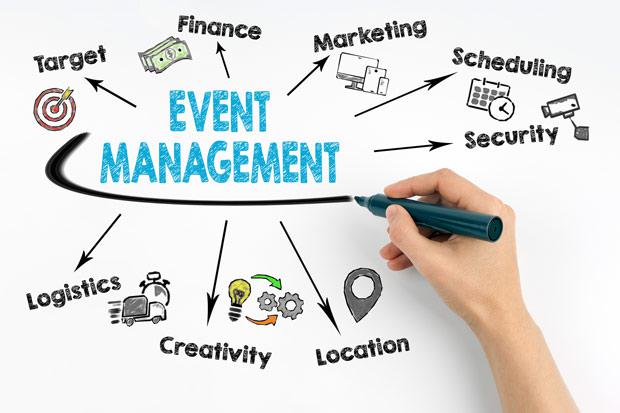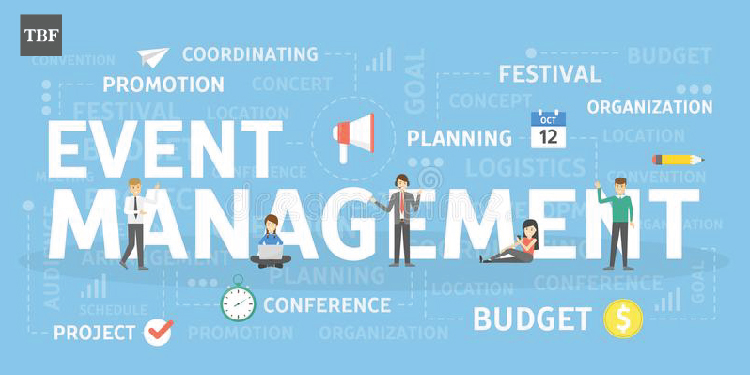How charlotte event companies use innovations to deliver flawless events
Comprehending Everything About Event Management and Its Function in Effective Events
Event management is a critical aspect in the implementation of effective celebrations. It includes cautious preparation and sychronisation to assure that every facet aligns with the designated vision. From business occasions to social events, the performance of occasion management can substantially affect attendee experience. Comprehending the nuances of this area exposes even more than simply logistics - charlotte event companies. The complexities of communication, budgeting, and analysis play vital roles in forming outcomes. What are the crucial elements that genuinely drive success?
The Importance of Event Management
Event management plays a vital role in guaranteeing the success of any gathering, whether it be a corporate conference, wedding, or festival. It encompasses the preparation, company, and execution of occasions, which needs thorough interest to information and a structured technique. Effective occasion management helps produce memorable experiences for attendees, fostering engagement and fulfillment.
Efficient event management can optimize resource allocation, ensuring that budget plans are stuck to while making the most of the effect of the occasion. It involves collaborating various components such as venue selection, supplier management, and logistics, every one of which contribute to a smooth experience.
Additionally, efficient event management can alleviate possible threats and obstacles, preparing for unexpected concerns that may emerge. By prioritizing communication and collaboration among stakeholders, event supervisors can guarantee that objectives are fulfilled, causing successful results and positive comments from participants. Eventually, the value of event management depends on its capacity to change visions right into fact.
Secret Parts of Event Planning
In event planning, a number of vital components are crucial for success. Budget management methods, place option tips, and timeline growth basics create the structure of an efficient plan. Each of these components plays a considerable function in guaranteeing that an event runs efficiently and satisfies its objectives.

Budget Management Methods
Effective spending plan management is a cornerstone of effective event preparation. It includes thorough allowance of resources to ensure that all facets of the occasion are sufficiently moneyed. A complete budget must include classifications such as venue, event catering, enjoyment, advertising, and backup funds for unforeseen costs. To preserve financial control, organizers ought to track expenses very closely and regularly contrast them against the budget. Making use of budgeting software can simplify this process, supplying real-time updates on economic status. Additionally, obtaining several quotes from suppliers can aid identify economical remedies without endangering quality. By establishing clear concerns and sticking to a well-structured spending plan, occasion managers can navigate economic obstacles and boost the overall success of the event.
Venue Choice Tips
Choosing the right venue is vital for any kind of successful event, as it sets the phase for the overall experience. When choosing a location, occasion planners should consider aspects such as area, capability, and accessibility. The location must be quickly reachable for participants, preferably positioned near transport choices. In addition, the size must fit the expected variety of guests easily, with area for any type of organized activities. Coordinators should also evaluate the place's services, consisting of audiovisual devices, seating setups, and catering alternatives. Budget plan restrictions play a significant function; because of this, recognizing the complete expenses, including surprise charges, is important. Visiting the location in advance allows for a direct assessment and aids ensure it straightens with the occasion's vision and requirements.
Timeline Growth Essentials
A well-structured timeline is crucial for effective event planning, acting as a roadmap that overviews organizers via each stage of the process. Trick parts of timeline growth include setting deadlines for each and every task, from preliminary idea to event execution. Organizers need to focus on activities, such as securing suppliers, validating the location, and promoting the event. Consistently upgrading the timeline assures that all stakeholders stay enlightened and liable. Additionally, incorporating buffer times for unanticipated hold-ups can help preserve overall energy. It is vital to straighten the timeline with the event's goals and sources, allowing for efficient allowance of time and spending plan. Ultimately, a well-crafted timeline improves coordination and fosters a successful occasion experience for both organizers and participants.
The Role of Communication in Events
Efficient interaction is necessary in occasion management, making certain that messaging is clear and constant. It helps with control amongst various stakeholders, which is vital for a smooth execution. Furthermore, having robust crisis communication approaches in place can substantially reduce challenges that may occur during an event.
Significance of Clear Messaging
Clear messaging works as the foundation of effective event management, making certain that all stakeholders-- participants, sponsors, and organizers-- are aligned in their expectations and understanding. Effective communication fosters depend on and transparency, permitting clear goals and preferred results to be articulated. When messages are concise and constant, they minimize the threat of misunderstandings and misconceptions, which can result in operational ineffectiveness. Clear messaging improves attendee involvement, as participants are more likely to attach with an event when they comprehend its objective and importance. Furthermore, it aids in marketing initiatives, enabling enrollers to identify the value of their financial investment. charlotte event companies. Eventually, clear messaging is vital for producing a natural experience that reverberates with all involved, assisting in the general success of the event
Control Among Stakeholders
Successful occasion management relies greatly on seamless coordination among stakeholders, where interaction plays a critical role. Effective interaction assurances that all events, consisting of vendors, enrollers, and team members, are aligned with the occasion's goals and timelines. Regular updates and clear instructions foster a joint environment, decreasing misconceptions and boosting performance. Stakeholders should develop open channels of interaction, making use of tools such as e-mails, meetings, and task management software to track progress and address worries promptly. Comprehending each stakeholder's function and duties boosts liability, guaranteeing that jobs are implemented as planned. Ultimately, well-coordinated communication amongst stakeholders is crucial for maneuvering the intricacies of occasion planning, leading to an effective and memorable occasion experience for all entailed.
Efficient Crisis Interaction Techniques
How can event supervisors assure that they are planned for unexpected challenges? Reliable dilemma interaction techniques are essential for taking care of unexpected circumstances during events. To start with, event managers must establish clear interaction channels, making sure all stakeholders are educated promptly. Establishing a situation interaction strategy ahead of time permits swift activity, detailing duties and obligations. Additionally, training staff to respond to crises sees to site here it that the group is equipped to manage emergencies successfully.
Using multiple interaction systems, such as social media, email, and public statements, aids get to varied target markets rapidly. Normal updates during a dilemma preserve transparency and construct count on among attendees. Eventually, proactive planning and clear interaction can considerably reduce the adverse influence of crises, causing effective event management, even in tough scenarios.
Budgeting and Financial Management
Budgeting and monetary management are vital components of reliable event preparation, as they often figure out the overall success of the occasion. A well-structured spending plan works as a roadmap, detailing expected expenditures and revenue streams. This monetary plan assists occasion supervisors assign sources efficiently and prevent overspending.
Key aspects of budgeting consist of place costs, wedding catering, enjoyment, advertising, and staffing. Each cost must be meticulously estimated and monitored throughout the planning process. Financial management also entails tracking income resources, such as ticket sales and sponsorships, to assure economic viability.
Routine economic reviews enable event coordinators to adjust their approaches as required, mitigating dangers related to unforeseen prices. By preserving clear economic documents, event managers can demonstrate liability to stakeholders and improve future planning efforts. Ultimately, reliable budgeting and economic management prepared for providing remarkable occasions while accomplishing business objectives.

Logistics and Operational Preparation
A well-structured budget plan prepares for efficient logistics and functional preparation in event management. It enables event organizers to allocate sources efficiently, guaranteeing that all logistical elements align with the overall vision. Key elements include place selection, transport setups, and equipment purchase. charlotte event companies. Organizers have to anticipate the demands of participants, suppliers, and personnel, guaranteeing seamless control throughout the occasion
Operational planning additionally encompasses personnel jobs and training, making certain all staff member comprehend their roles. Interaction is crucial; therefore, establishing clear networks among stakeholders minimizes misconceptions. Furthermore, backup prepare for unanticipated situations, such as stormy climate or technical failings, are important to keep smooth operations.
Eventually, the success of an occasion heavily counts on careful logistics and functional preparation. By prioritizing these aspects, coordinators can develop memorable experiences while adhering to budget plan restraints and timelines, therefore accomplishing organizational goals.
Advertising and Promotion Strategies
While effective logistics and functional preparation develop the foundation of occasion management, successful advertising and marketing and promo approaches are important for bring in guests and guaranteeing a high level of involvement. These approaches typically begin with identifying the target market, which permits event organizers to customize their messaging and select suitable communication networks. Utilizing social media platforms, e-mail marketing, and partnerships with influencers can significantly magnify reach and exposure.
Developing engaging content such as video clips, blog sites, and graphics can create interest and exhilaration around the occasion. Early bird ticket offers and promotional discount rates likewise work as reliable rewards for possible guests. Involving narration and clear phone call to activity are pivotal in converting rate of interest into real presence. Additionally, leveraging analytics helps in evaluating the performance of advertising efforts, enabling organizers to adjust approaches in real-time. Collectively, these elements add to a successful occasion that resonates with its target market.
Examining Event Success and Comments
Successful assessment of event success and responses is crucial for constant improvement and lasting growth in occasion management. This process includes systematically collecting and examining data associated additional resources with various aspects of an occasion, consisting of attendee complete satisfaction, logistical implementation, and general influence. Surveys, meetings, and focus teams prevail techniques employed to gather qualitative and measurable feedback from individuals.
Secret performance indicators (KPIs) such as attendance numbers, revenue generation, and social media involvement also play a vital role in determining success. By assessing this info, occasion managers can identify staminas to construct upon and weaknesses to resolve in future events.
Responses permits for changes to be made in real-time, boosting the guest experience and fostering commitment. Eventually, a detailed analysis procedure not only informs future planning but also adds to a more durable track record for the event management team, guaranteeing sustained click to investigate success in an affordable landscape.

Regularly Asked Questions
What Certifications Are Required to Come To Be an Event Supervisor?
To come to be an occasion supervisor, individuals commonly call for a combination of relevant education and learning, such as a level in hospitality or organization management, and practical experience in planning, organizing, and carrying out numerous kinds of occasions effectively.
Just how Do I Select the Right Venue for My Event?
Choosing the right venue entails reviewing the event's function, capability, place, services, and budget plan. A complete evaluation warranties that the location aligns with the event's goals and boosts the general experience for guests.
What Modern Technology Tools Are Important for Event Management?
Vital technology tools for event management include registration software program, event apps, ticketing platforms, task management tools, and analytics software. These resources streamline preparation, boost attendee interaction, and help with communication, eventually adding to a successful event experience.
How Do I Deal With Unforeseen Issues During an Event?
To handle unforeseen problems throughout an occasion, one must stay tranquil, examine the scenario, communicate properly with the team, carry out pre-planned backup measures, and adjust swiftly to guarantee marginal disruption to the total experience.
What Are the most recent Trends in Event Management?
The most recent fads in occasion management include online and hybrid styles, sustainability techniques, individualized participant experiences, improved use technology, and immersive settings. These trends aim to develop even more interesting and remarkable experiences for participants.